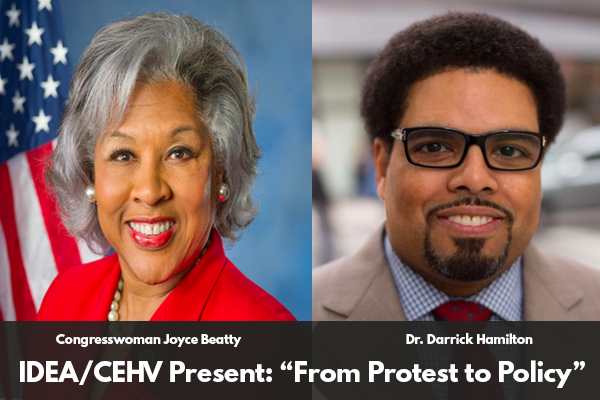WATCH: Dr. Darrick Hamilton, Congresswoman Joyce Beatty, "From Protest to Policy"

On July 7, The Institute for Democratic Engagement & Accountability (IDEA) and Center for Ethics and Human Values (CEHV) were proud to host U.S. Representative Joyce Beatty (OH-3) and Dr. Darrick Hamilton of OSU’s Kirwan Institute as keynote speakers for a panel discussion, “From Protest to Policy: How Does the Movement Sparked by George Floyd’s Death Ensure Lasting Change?” This event was held online due to the ongoing COVID crisis.
As both Congresswoman Beatty and Dr. Hamilton also have deep ties to The Ohio State University, they were the ideal leaders to offer the OSU community their assessment of and guidance on what institutions and individuals can do at this moment to translate the energy of these protests into lasting change. “As our country grapples with its next steps, we need innovative leaders like Rep. Beatty and Dr. Hamilton to be in conversation about how democratic values like fairness and dignity can inform significant legal reforms and policy changes,” said Dr. Piers Turner, Director of CEHV and co-host of the event.
Congresswoman Joyce Beatty has represented Ohio’s 3rd Congressional District since 2013, and has been one of the most prominent supporters of the George Floyd Justice in Policing Act in Congress, and other efforts to address systemic racism. She recently made headlines after being pepper-sprayed by police at a protest following the death of George Floyd. “We have all watched with horror the senseless killings of too many unarmed Black men and women—and it is long past time we go from agony to action,” says Rep. Beatty.
Dr. Darrick Hamilton is Executive Director of the Kirwan Center for the Study of Race and Ethnicity and a pioneer in the field of stratification economics, studying race and its effect on the health and wealth of individuals and communities of color for over twenty years. His ideas on how to fully address systemic racism throughout our society have become part of the national conversation.
The online discussion concluded with Q&A from the online audience, which included over 300 participants from not only OSU but the entire country.
